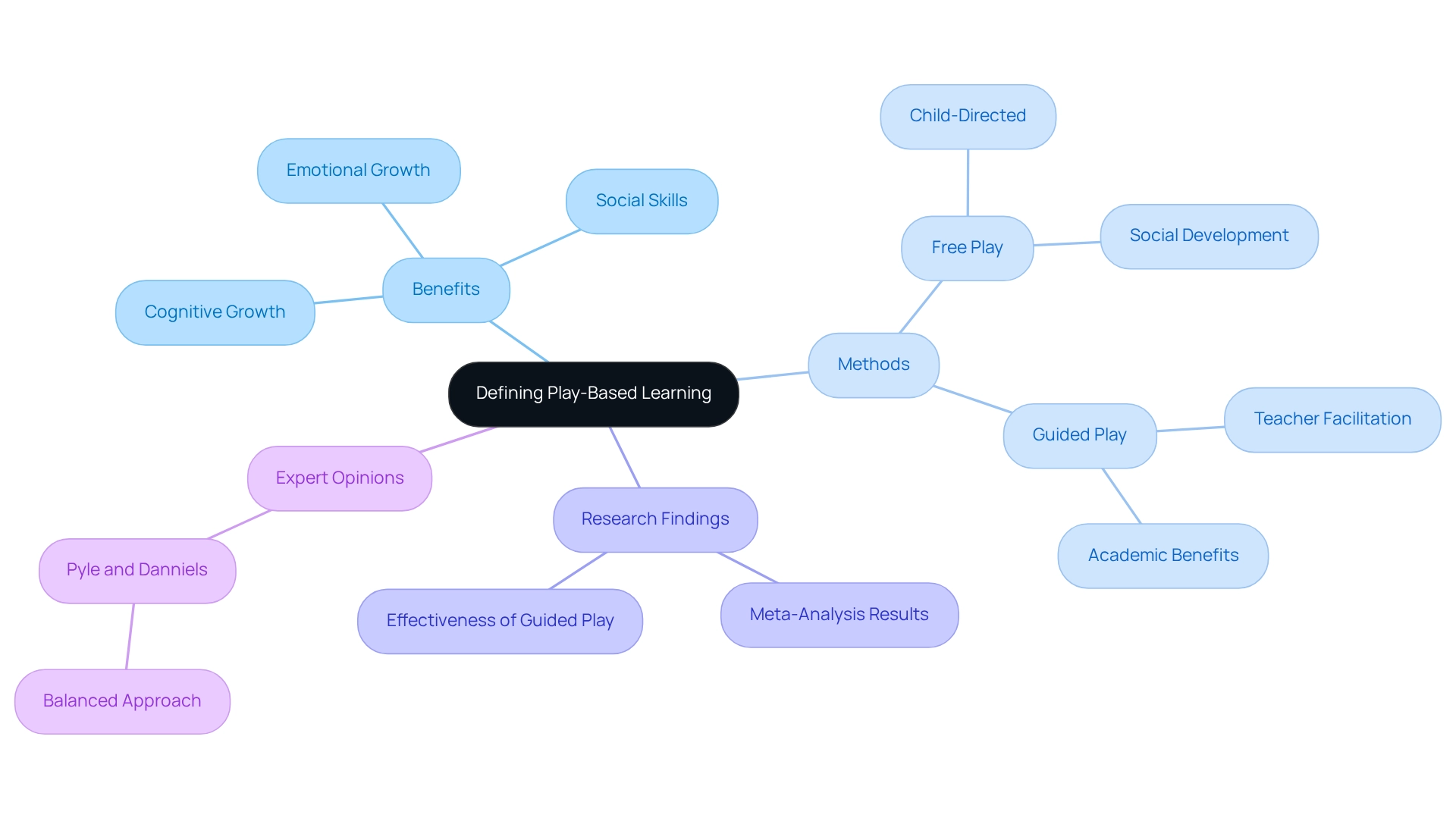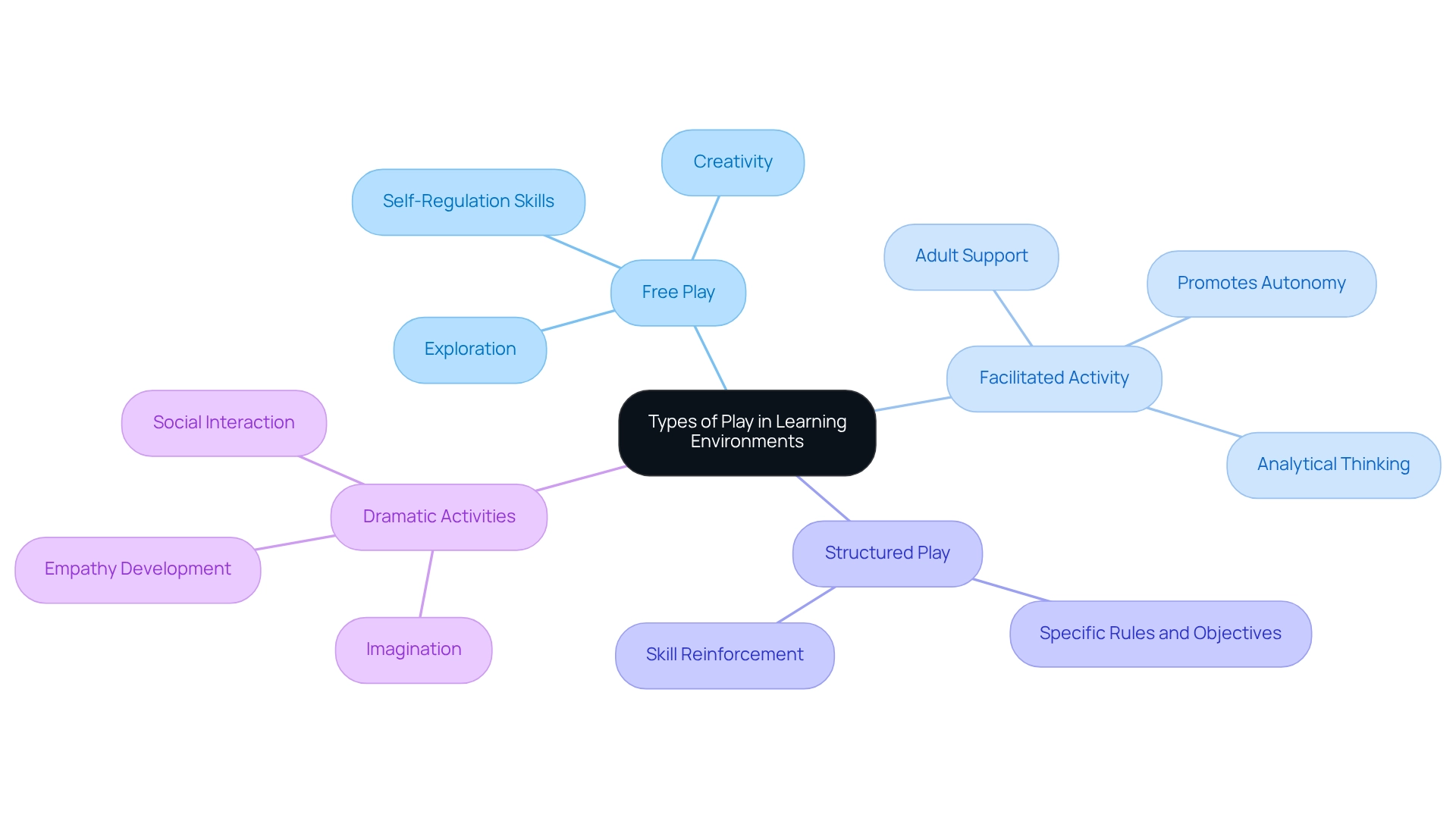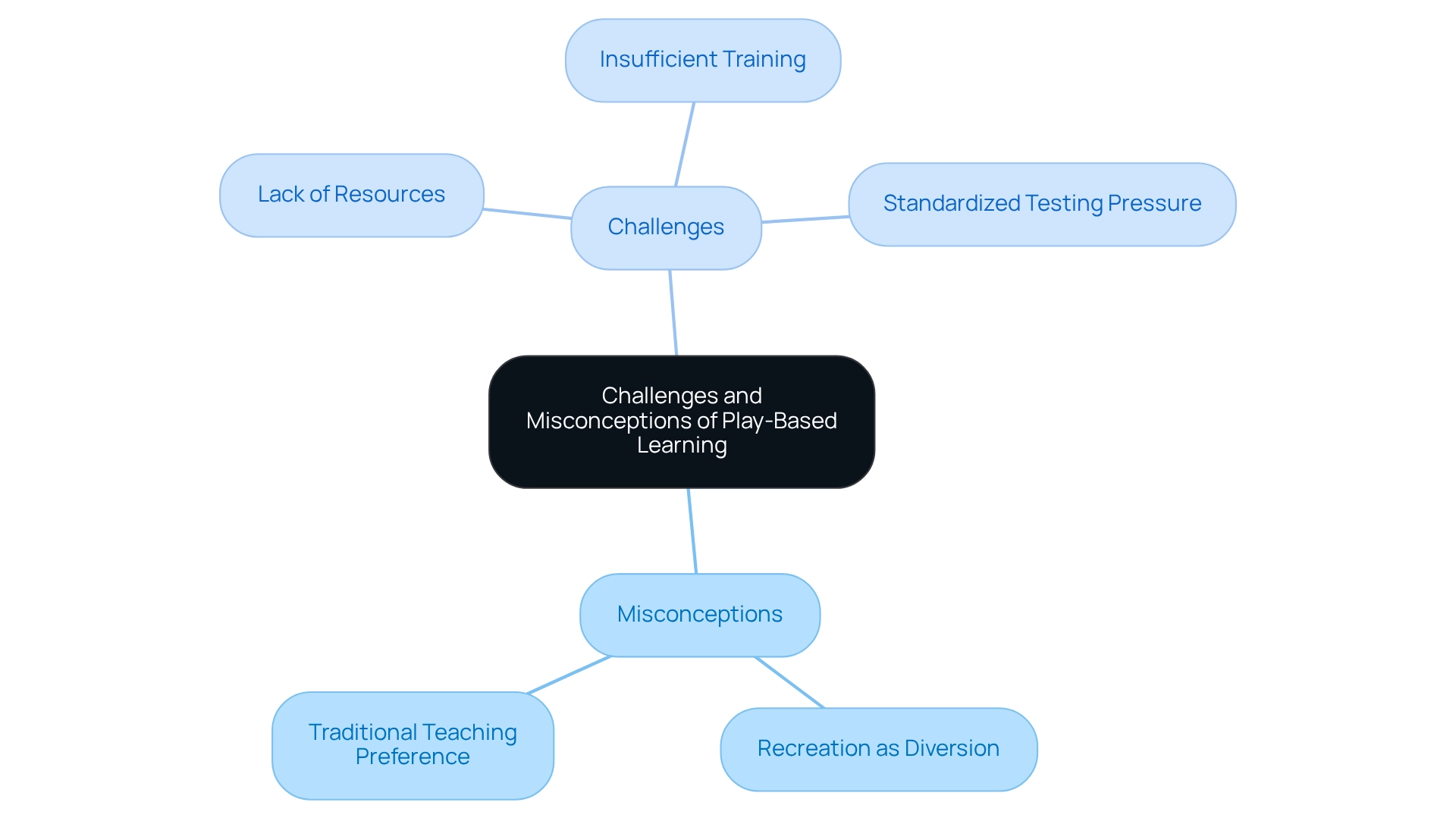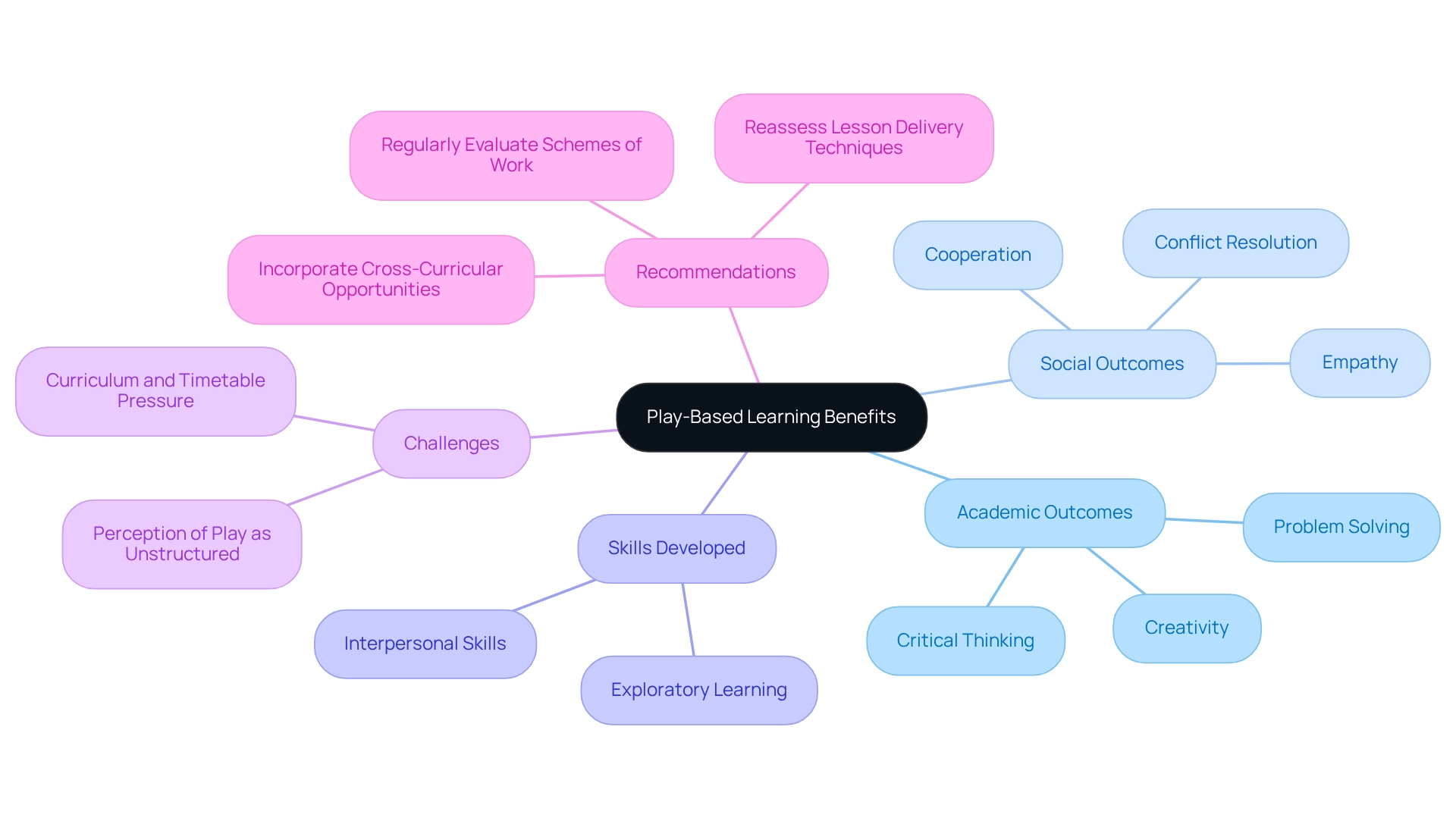Overview
Play-based learning is a nurturing educational approach that highlights the vital role of recreation in supporting children's cognitive, social, and emotional development through active engagement and exploration. Imagine watching your child flourish as they learn through play—this article sheds light on how various forms of play, such as free play and guided play, significantly enhance critical skills like creativity, problem-solving, and social interaction.
However, many parents face challenges and misconceptions that can hinder the implementation of this valuable method in educational settings. It's important to understand these obstacles and seek ways to overcome them. By addressing these concerns, we can foster an environment where children thrive through play.
As you read on, consider how you can support your child’s learning journey. Share your experiences or thoughts in the comments, and let’s create a community that values the power of play in education. Together, we can advocate for a more playful and enriching learning experience for all children.
Introduction
In a world where education often emphasizes structured lessons and standardized testing, the transformative power of play-based learning shines as a beacon of hope for early childhood development. This dynamic approach places play at the heart of the learning experience, allowing children to explore, discover, and grow in ways that traditional methods cannot match. By nurturing creativity, critical thinking, and essential social skills, play-based learning enriches academic outcomes while also fostering emotional intelligence and resilience.
As educators and parents navigate the challenges and misconceptions surrounding this innovative method, understanding its multifaceted benefits becomes crucial in shaping well-rounded, capable children who are ready to thrive in an ever-evolving world.
Defining Play-Based Learning: An Overview
Activity-centered education is a nurturing approach that places recreation at the heart of the educational process. It recognizes that young individuals thrive when they are actively engaged in exploration and discovery. This method contrasts sharply with traditional educational models, which often emphasize direct instruction and rote memorization. In a play-based learning environment, children are empowered to lead their own learning experiences, fostering creativity, critical thinking, and problem-solving skills.
Research underscores the vital role of recreation in early childhood education, revealing its importance for cognitive, social, and emotional growth. A balanced approach that combines play with brief periods of direct instruction has proven particularly effective. For example, a meta-analysis reveals that guided play—where educators actively facilitate learning—can lead to better academic outcomes than direct instruction alone for children under eight.
As Pyle and Danniels suggest, 'the most suitable and effective method is a balanced approach that incorporates short periods of direct instruction within a play-centered environment.' This indicates that blending play with structured instruction can enhance educational effectiveness.
Moreover, recent studies highlight that activity-centered education not only nurtures social skills through child-led interactions but also supports the development of specific academic skills, such as letter recognition and phonological awareness, which benefit from direct teaching. As educators evolve from traditional instructors to facilitators through teacher training programs, they can create environments that maximize the benefits of experiential education.
The significance of recreation in early childhood education is further supported by expert opinions that advocate for a comprehensive understanding of what play-based learning entails. This approach not only enriches the learning experience but also aligns with the developmental needs of young individuals, making it an essential component of effective early education. Additionally, the case study titled 'Free Play vs. Guided Play' illustrates the distinctions between these two methods, demonstrating that while free play primarily enhances social skills, guided play can yield a wider array of academic benefits.

The Benefits of Play-Based Learning for Child Development
What is play-based learning? It is a powerful catalyst for youth development, offering a multitude of benefits that extend beyond mere enjoyment. This method significantly enhances cognitive abilities, as individuals engaged in play-based activities often exhibit superior problem-solving skills and heightened creativity. Research indicates that participation in these activities fosters essential social interactions, teaching children vital skills such as cooperation, negotiation, and empathy.
Cooperative interaction typically begins around the age of four and remains a crucial aspect of childhood development, highlighting the importance of these early experiences.
Moreover, play serves as an essential platform for emotional development, providing young individuals with a safe space to express their feelings and learn effective emotional regulation. This holistic growth is crucial, equipping children not only for academic success but also for meaningful social interactions.
However, case studies reveal the challenges educators face in implementing play-oriented education, including resistance to change and curriculum constraints. As McKeon aptly states, "It’s the missing piece of the puzzle to help our younger individuals get ahead." Overcoming these obstacles is vital, as the benefits of play-centered education for cognitive and social growth are profound.
Additionally, the need for improved policies to support playful parenting underscores the significance of creating a nurturing environment for families. As we look toward 2025, the concept of play-based learning continues to gain attention, emphasizing its role in fostering well-rounded, resilient individuals. We encourage parents to engage with their children through play and advocate for supportive educational practices that prioritize this essential approach.
Exploring Different Types of Play in Learning Environments
In educational settings, different forms of recreation can be effortlessly incorporated, each fulfilling unique developmental roles that are vital for comprehensive youth development. These include:
- Free Play: This child-directed form of play fosters exploration and creativity, allowing children to engage in activities without structured guidelines. Research emphasizes that unstructured activities are crucial for cultivating self-regulation skills, which are fundamental for academic achievement.
- Facilitated Activity: In this method, an adult assists by offering support and organization while enabling young individuals to direct their educational experiences. This balance promotes autonomy and analytical thinking, as educators intervene to help when young learners face difficulties, improving their understanding beyond what could be accomplished through solitary activities. As noted by Tapscott, "The educator has become a facilitator," emphasizing the evolving role of educators in this context. Winnie O’Leary, an experienced instructor, mentions that educators may intervene "when a student seems to find an activity overly challenging or overly simple" to assist them in learning beyond what could be achievable during solitary activities.
- Structured Play: This type involves activities with specific rules and objectives, often designed to teach particular skills or concepts. Structured activities can effectively reinforce learning outcomes, making it a valuable tool in early childhood education.
- Dramatic Activities: Role-playing scenarios in dramatic activities promote imagination and social interaction, enabling youngsters to explore various perspectives and cultivate empathy. This form of activity is essential for social-emotional development, as it assists youngsters in navigating complex social dynamics.
Each category of performance contributes significantly to various aspects of development, from cognitive skills to social-emotional growth. A study titled 'Impact of Recreation Time on Self-Regulation and Academic Skills' found that increased recreational time is positively associated with children's self-regulatory abilities, which indirectly enhances their early reading and math competencies. However, it is important to note that once self-regulation is accounted for, leisure time's direct relationship with academic skills diminishes.
This highlights the significance of encouraging varied activities during preschool years to enhance school readiness skills.
Additionally, recent efforts, like New Hampshire's partnership with REL Northeast & Islands, seek to promote what is play-based learning and develop assessment strategies to monitor the effectiveness of these approaches across the state. Such efforts indicate an increasing awareness of the essential function that recreation, in all its forms, serves in early childhood education.

The Stages of Learning Through Play: A Developmental Perspective
As children grow, they progress through distinct phases of activity, each marked by unique interactions and learning experiences. Understanding these stages is essential for caregivers, as it allows them to provide the appropriate support and resources tailored to the developmental needs of young individuals. Let's explore these stages together.
- Solitary Play: At this initial stage, children engage in activities independently, focusing solely on their own interests. This type of play is crucial for promoting self-regulation and emotional management, as young ones learn to navigate their own thoughts and feelings.
- Parallel Play: In this phase, typically seen in toddlers, children play alongside their peers, using similar materials but without direct interaction. This form of activity lays the groundwork for social interaction, enabling children to observe and learn from one another while maintaining their individual focus.
- Associative Play: As children develop, they begin to engage more with their peers, sharing resources and ideas while still participating in their own play. This stage signifies a notable transition toward social cooperation, where children learn to negotiate and collaborate, enhancing their social skills.
- Cooperative Play: In this advanced stage, children work together towards a common goal, engaging in complex social interactions. This cooperative play fosters teamwork, communication, and problem-solving skills, which are essential for later social development.
Recognizing these stages helps caregivers understand play-based learning. Studies indicate that children's ability to self-regulate and manage emotions significantly improves with play and caregiver involvement. Additionally, a case study titled 'Cultural Influences on Play and Learning' highlights how cultural values shape children's play experiences, contrasting the emphasis on independence in American culture with the interdependence observed in societies like Japan.
This underscores the importance of acknowledging cultural contexts in shaping activities and educational opportunities, ultimately influencing children's social abilities and emotional growth.
Expert insights remind us that while these stages provide valuable guidance, learning occurs throughout all phases of activity. Amanda Filbey, MA, CCC-SLP, notes, "These stages can be useful when characterizing a young one's activities, but remember that they aren’t prescriptive." Learning is indeed a continuous journey!
By nurturing an environment that encourages various forms of engagement, caregivers can enhance children's educational experiences and help them understand play-based learning for their overall growth. Notably, extensive research supports these insights, with 408 articles referenced through CrossRef, further affirming the importance of understanding development in play.
Challenges and Misconceptions of Play-Based Learning
Despite the well-documented benefits of play-based education, misconceptions and challenges about what play-based learning entails continue to exist. Many people mistakenly believe that recreation serves only as a diversion from serious learning. This leads some educators to favor traditional teaching methods that emphasize direct instruction. Unfortunately, this perspective can lead to a significant underutilization of play-based learning in educational settings.
Additionally, some parents may not fully grasp the significance of play-based learning, which can create barriers to its implementation. Challenges also arise from a lack of resources and insufficient training for educators, hindering the successful integration of recreational activities into curricula. The pressure of standardized testing often overshadows the concept of play-based learning, creating an environment where academic performance is prioritized over holistic experiences.
A recent study highlights that increasing policy pressure on school readiness can lead to professional skepticism among early childhood education professionals. Research from the University of Cambridge reveals that structured activities, which balance child independence with adult support, can greatly enhance skill development compared to conventional methods. This underscores the importance of educators embracing a deeper understanding of play-based learning and its educational role.
The findings suggest that educators who view recreation as essential to education are more likely to engage in directed activities, ultimately improving academic outcomes.
To address these challenges, it is vital to engage in advocacy and education that underscore the significance of recreation in early childhood education. Educators should focus on asking open-ended questions that foster deeper understanding. As Christakis notes, 'The open-ended response truly creates a vast space for spontaneous and deep comprehension.' By nurturing an environment that values play and providing enhanced training for instructors, we can unlock the full potential of activity-centered education, ultimately benefiting children's development and academic success.

The Role of Educators and Parents in Supporting Play-Based Learning
Educators and parents play a vital role in nurturing what is play-based learning, each contributing uniquely to a child's development. Educators are tasked with creating environments that not only encourage exploration but also offer a variety of activity opportunities. This involves observing and guiding children during activities, allowing them to learn organically without overshadowing their experiences.
Research indicates that educators who recognize the importance of recreation in education are more likely to implement effective guided activities, leading to better educational outcomes. Yet, challenges such as resistance to change, curriculum limitations, and insufficient time for meaningful activities can impede effective implementation. This underscores the necessity for comprehensive policies and ongoing professional development.
Conversely, parents can significantly enhance play-based education at home. Engaging in activities with their children, providing resources that spark imagination, and promoting unstructured play are essential strategies. This active involvement not only supports the educational journey but also strengthens the bond between parent and child.
As Amy Blessing highlights, free play, or self-directed play, is often regarded as the gold standard of play. This brings us to the question of what constitutes play-based learning and emphasizes its importance in development.
Collaboration between parents and educators is crucial for fostering a cohesive approach to learning. When both parties align their strategies, children reap the benefits of a seamless integration of activity-centered principles across different environments. This partnership can help address challenges, as illustrated in the case study 'Teachers' Perspectives on Learning through Play,' which reveals that while many educators acknowledge the value of play, their implementation of play-related practices can be inconsistent.
By working together, parents and educators can create a nurturing and enriching atmosphere that amplifies the advantages of experiential education.
Practical Strategies for Implementing Play-Based Learning Activities
Introducing play-oriented educational activities can be both fun and instructive, promoting vital abilities in young individuals. Imagine a world where learning is a joyful adventure! Here are some effective strategies to consider:
- Create Learning Stations: Designate specific areas in the classroom or home for various types of play, such as art, construction, or dramatic play. Studies indicate that well-organized educational stations can greatly boost youth engagement and participation, resulting in better focus and performance. Think about how exciting it is for children to explore different activities in a dedicated space!
A recent case study highlights that effective interactive learning emphasizes student participation and collaboration. By integrating digital technologies and utilizing outdoor spaces, children can explore their surroundings and engage in physical activities. This method not only fosters physical well-being but also stimulates curiosity and exploration—essentials for cognitive growth.
- Use Everyday Materials: Inspire creativity by offering common household items for activities, such as boxes, fabric, and kitchen utensils. These materials can spark creative engagement and problem-solving, essential components of early learning. How wonderful it is to see children transform ordinary objects into extraordinary creations!
- Facilitate Group Interaction: Organize group activities that promote teamwork and social skills, such as cooperative games or collaborative art projects. Participating in group activities helps youngsters enhance their communication abilities and understand the importance of teamwork. To enrich these experiences, educators should refrain from 'checking questions' and instead utilize open-ended questions to encourage spontaneous and profound learning. These strategies help establish a rich environment for play-based learning that promotes holistic development. Significantly, guided activities have been shown to have a greater positive effect on early math skills, shape knowledge, and task-switching abilities compared to conventional direct instruction. As Jill McCarroll observes, a recently published meta-analysis discovers that, for youth under eight, guided play proved to be more effective for teaching academic content than direct instruction. By applying these practical strategies, educators and parents can unlock the full potential of experiential education, fostering an inclusive and engaging environment for all youth. Let's work together to create these enriching experiences for our children!
Long-Term Benefits of Play-Based Learning: Academic and Social Outcomes
Studies consistently show that playful education offers significant long-term advantages for our children's academic and social growth. When youngsters participate in activity-oriented experiences, they nurture vital abilities like creativity, critical thinking, and problem-solving. These skills are essential as young learners navigate their educational journeys. Notably, the average test proficiency for historically underrepresented students in leading public high schools stands at just 49%. This statistic highlights the urgent need for effective educational strategies, such as experiential education, to enhance outcomes.
Socially, children engaged in activity-centered education exhibit improved interpersonal skills, including cooperation, empathy, and conflict resolution. As Peter insightfully noted, "A big takeaway from the research, I think, is that little kids from poor families need play every bit as much as do those from wealthier families." This statement underscores the universal importance of play, transcending socioeconomic backgrounds. However, the journey towards adopting activity-centered education can face hurdles, particularly due to strict school schedules that prioritize academic results. This challenge is evident in the case study on 'Curriculum and Timetable Pressure.'
Schools are encouraged to reassess their lesson delivery techniques, incorporate cross-curricular opportunities, and regularly evaluate their schemes of work to facilitate exploratory learning. This approach not only fosters a passion for knowledge but also cultivates a sense of curiosity that promotes ongoing engagement in educational endeavors. Ultimately, prioritizing play-based learning in early childhood education can lead to significant returns in children's holistic development and future success. Let us advocate for an educational environment where every child can thrive through play.

Conclusion
Play-based learning is not just a method; it is a cornerstone for holistic child development. By emphasizing exploration and discovery, it nurtures creativity, critical thinking, and social skills. Unlike traditional educational approaches that rely heavily on rote memorization, this method calls for a balanced integration of both strategies, ensuring optimal learning outcomes for our children.
The benefits of play extend far beyond academics; they foster emotional intelligence and resilience. Through various types of play—be it free, guided, or structured—children cultivate essential social skills, emotional regulation, and cognitive abilities. As caregivers and educators, recognizing the stages of play is crucial. Tailored support can help children thrive in their learning environments, allowing them to flourish.
Yet, we must acknowledge the misconceptions and challenges that may arise. Resistance from educators and parents, coupled with an overemphasis on standardized testing, can impede the effective implementation of play-based learning. It is essential to advocate for a shift in perception and policy, creating a supportive atmosphere where playful learning can thrive.
Collaboration between educators and parents is vital in reinforcing play-based principles in both classrooms and homes. By nurturing an environment that values play, we unlock our children’s full potential, paving the way for long-term academic success and improved social interactions. Embracing play as a fundamental aspect of early childhood education not only cultivates a love for learning but also equips our children with the necessary skills to navigate an ever-evolving world. Let us come together to support this vital approach, ensuring our children have the best opportunities to succeed.
Frequently Asked Questions
What is activity-centered education?
Activity-centered education is a nurturing approach that places recreation at the core of the educational process, emphasizing exploration and discovery. It contrasts with traditional educational models that focus on direct instruction and rote memorization.
How does play-based learning benefit children?
Play-based learning enhances cognitive abilities, fosters problem-solving skills, and promotes creativity. It also supports social skills through interactions, teaching cooperation, negotiation, and empathy, while providing a safe space for emotional development.
What is the role of recreation in early childhood education?
Recreation plays a vital role in early childhood education, contributing to cognitive, social, and emotional growth. A balanced approach that combines play with brief periods of direct instruction has shown to be particularly effective.
What is guided play, and how does it differ from direct instruction?
Guided play involves educators actively facilitating learning during play, which can lead to better academic outcomes for children under eight compared to direct instruction alone. It combines the benefits of play with structured teaching.
What are the challenges educators face in implementing play-based education?
Educators often encounter resistance to change and curriculum constraints when trying to adopt play-oriented education methods. Overcoming these obstacles is essential to realize the benefits of play-centered education.
How can parents support play-based learning?
Parents can engage with their children through play and advocate for educational practices that prioritize play-based learning, creating a nurturing environment that supports their development.
Why is a balanced approach important in early childhood education?
A balanced approach that incorporates both play and short periods of direct instruction has been shown to enhance educational effectiveness, supporting the development of both social and academic skills in young learners.
What is the significance of expert opinions on play-based learning?
Experts advocate for a comprehensive understanding of play-based learning, highlighting its alignment with the developmental needs of young individuals and its essential role in effective early education.




